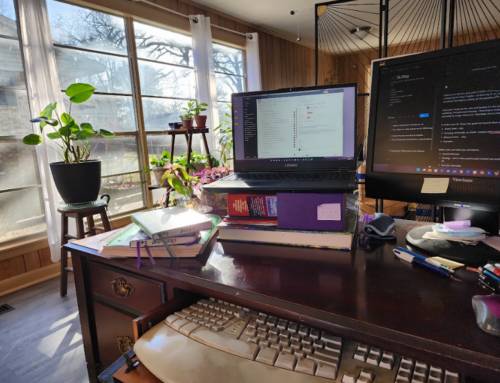Today is International Women’s Day, observed since 1909, recognized by the United Nations in 1975. While scouring my mother-in-law’s kitchen sink this afternoon, I had my own realization about women and how we care for each other. It made me nostalgic, sad, proud, and concerned all at the same time.
Soon after I became a McClatchy, over twenty-seven years ago, my husband and I accompanied his parents for a weekend at the family ranch in Trickam, TX—a town so small they don’t have their own post office, and the one church building serves all denominations depending on which Sunday of the month it is (if there’s a fifth Sunday, they all gather to sing out of the hymnal). My new grandma-in-law, who most referred to as Ma Daisy, was in her late 80s by that time and still lived alone on a 1500 acre working cattle ranch. Her son had the adjoining ranch , and her daughter lived on a similar ranch down the road a spell. I married into the branch of the family that had left for Houston, and then later settled in Dallas.
I knew the first time I met Ma Daisy we could be kindred spirits. This woman was strong but gentle, independent yet caring, frugal and generous. She had a sparkle in her sweet blue eyes that lit up the room. She had attended my wedding with her daughter and daughter-in-law, but I didn’t really know her until that weekend. I was the odd duck in the room, but that’s to be expected when joining a family. I was taught growing up that whenever I found myself in an unfamiliar situation, to listen and observe, and follow the example of the host/hostess and my elders. So that’s what I did that weekend.
Ma Daisy was so happy to have us there, and was adamant that she was going to prepare a huge family dinner and invite all the other local family members. My new husband was thrilled to see everyone. Steve is always the gregarious, more the merrier, member of any group. His parents, however, groaned and tried to talk her out of it. She would not be dissuaded. My mother-in-law excused herself to the other room, and called her two sisters-in-law. Within a very short time, my father-in-law’s sister and her family arrived, and then his brother and his family arrived. Ma Daisy was beside herself with joy at having everyone home.
As she greeted everyone, and the men distracted her a little, the three sisters-in-law descended on the kitchen. I followed my mother-in-law, not knowing what else to do as I was the only young woman present, and was quickly put to work. Those three women, with military precision, took turns cleaning, cooking, and distracting Ma Daisy. I was welcomed into the group by being handed an apron and put in the cleaning, cooking, and distracting rotation. It was the craziest thing I had ever experienced.
In her desire to be a good hostess, Ma Daisy offered me iced-tea or water often. Each time, before I could answer, one of the three sisters-in-law would remind her that we brought bottled water from Dallas. I hadn’t known that, but sure enough a bottle of water was thrust upon me whenever my hands were empty. My mother-in-law and I drank more bottled water that day than I thought possible.
My parents’ lesson to observe and follow the leader paid off. In a couple hours, those three very different women were able to clean that old ranch kitchen, wash every dish, cook and serve a meal, put up leftovers for Ma Daisy, clean and put away every dish and piece of linen, leave the kitchen sparkling, and most miraculously—they did it in such a way that Ma Daisy was able to believe she had done it all herself.
It was a lovely day with a wonderful family that I was now part of. But I was still confused. It wasn’t until we were on our way back to Dallas that I felt comfortable asking about it. My mother-in-law laughed, my father-in-law smiled at me through the rear-view mirror, and my young husband looked confused. About the water, I was told that the water to the house came directly from the creek. It was filtered, but not treated, and when the creek is low—as it had been that weekend—the water quality is questionable. Those who grew up drinking the water were fine with it, as apparently Steve was, but it always made his mom sick, and she didn’t want to chance it ruining my weekend. Bottled water was something Mom had always done, so they didn’t think to warn me.
As for the clean/cook/distract operation that could make Navy SEALS take note, this was something they had started a few years earlier. It seemed Ma Daisy’s eyesight, especially close vision, was failing, and her standards of housekeeping were slipping. Additionally, sometimes they discovered a bit of food gone bad, and suspected she wasn’t eating regularly. So the sisters-in-law took it upon themselves to do a bit of cleaning and cooking on the sly when they could arrange it without her knowing. Since Steve’s parents hadn’t alerted the extended family that we were coming, and had planned to take Ma Daisy into town for a special dinner, the kitchen was not in shape for her to entertain as she wanted.
Little more than twenty-five years later, my father-in-law is now in a nursing home, and my mother-in-law is having some health problems. I’ve been staying at their home for almost two weeks while she stays at the nursing home with him temporarily. My mother-in-law has always been one of the best, most fastidious, house-keepers. I was quite intimidated by her for many years. Over the last few days, I’ve found myself sweeping floors, rewashing dishes, dusting up cobwebs and dust bunnies. My mother-in-law would be appalled if she knew (she won’t read this, so don’t say anything!).
It wasn’t until a few hours ago, as I was scouring her kitchen sink, that it hit me. The memory from twenty-six years ago, and the lessons I learned from observing women from the preceding generation washed over me. This is how women have honored and helped each other for centuries. As I thought more, I remembered many examples from childhood of my mother and her sister doing similar things for their mother, it just never made as dramatic an impression on me since I saw it often in so many little and unassuming ways. Women from families who settled Texas, women in Wisconsin who were second-generation German/Russian-Americans, ranch women, city women—different as can be, all honoring the women who came before them in the same way.
Please don’t think I’m saying a woman’s place is in the kitchen, I don’t believe that (and my brothers and sons were taught to manage a kitchen better than a lot of women I know to prove it), however, a lot of uniquely female, lovely memories and conversations have taken place in kitchens. Perhaps since the beginning of time, women have quietly and cheerfully picked up the slack for each other. Without drawing attention to ourselves, and while allowing our mothers and grandmothers to remain independent as long as possible, we do what we can. Not because we have to, but because it’s how we honor the love, care, and sacrifices they poured out on us—usually while asking if we want more to eat.
It’s not a political movement, it’s not the way the men do it, and it makes me proud.
While the next generation of women are getting press by marching and not showing up for work today, I am concerned about how they will care for each other and their mothers. As my generation has been busy juggling careers, families, and personal interests, have we outsourced too many of these little daily details? Holiday and family gatherings are often eaten in restaurants in a central location, or on paper plates so we don’t have to spend time in the kitchen. That’s all fine, but will anyone notice when I start slipping in my housekeeping, not that I’ve ever been accused of being as diligent as my mother or mother-in-law. What exactly have our daughters learned by observing us? Will the next generation outsource our care like we do family meals and kitchen chores? Families are smaller and farther apart these days. What will happen to women who are unable or choose not to have children?
I’m not a feminist by the current political definition. I do believe in equal opportunity, equal rights under the law, equal education, equal pay for doing equal work with equal experience. But, I don’t believe men and women are equal in every way, and I do believe that’s a good thing. We balance each other. We have unique strengths, interests, and ways of doing things. I’m proud of the strong, intelligent, creative, independent, caring, generous, educated, perceptive, native-born and immigrant, women who have come before me. I pray we don’t lose what makes us all those wonderful things in our march for absolute equality.





Beautiful insight and perspective!